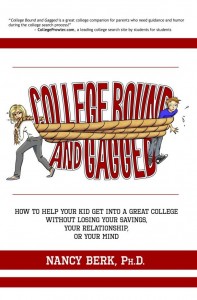 It’s Friday and Twitter’s Follow Friday event reminded me that there are so many parents out there in cyberspace looking for help along the college admissions journey. Here’s a short list of helpful “parents” (along with myself, of course) that you should bookmark, follow and tap into on Facebook for the best encouragement and parent support along your journey.
It’s Friday and Twitter’s Follow Friday event reminded me that there are so many parents out there in cyberspace looking for help along the college admissions journey. Here’s a short list of helpful “parents” (along with myself, of course) that you should bookmark, follow and tap into on Facebook for the best encouragement and parent support along your journey.
Jane Kulow (@CvlKulow)
Jane is a parent of college-bound teens and the owner/author of a blog that has chronicled her admissions journey with her kids (Dr. Strange College-or how I learned to stop worrying and love the journey). Her blog is jam-packed with great information, parenting encouragement and tips to help you sift through all the information you are bombarded with during the college admissions process.
Nancy Berk (@NancyBerk)
Nancy is also a parent who has survived the journey and written about it in her “hit” book, College Bound and Gagged. Nancy gives parents a comedic break by helping you laugh at yourself and your kids during this stressful time. There’s nothing better than a little laughter to ease the stress and help you see the bigger picture.
Z. Kelly Queijo (@collegevisit)
Kelly is the mastermind behind Smart College Visit, a website providing you with information and resources to help make the college visit a success. Her tools to help you plan your college visits provide parents with all the resources they need in one place. Her cool “mobile app” for Virginia Tech is the first of it’s kind!
Monica Matthews (@AidScholarship)
Monica is a parent herself and she is the scholarship guru, finding scholarships for her sons and teaching parents to do the same. Her simple ebook, How to Win College Scholarships, walks you through the process step by step. She also blogs, giving parents tips and scholarship updates on a regular basis.
Paul Hemphill (@vcollegeadvisor)
Paul learned the hard way that colleges aren’t necessarily a parent’s friend. His frustration with the admissions process during his sons’ journey, prompted him to help other parents and students learn the secrets to take charge during the journey and “win” in this highly competitive process. His video series is second to none and every parent needs to arm themselves with his arsenal of sage advice.
This is just a short list of parents out there offering you help along your journey. Be an informed parent and tap into their advice and wise counsel. Parents helping parents–what better way to survive the journey?







